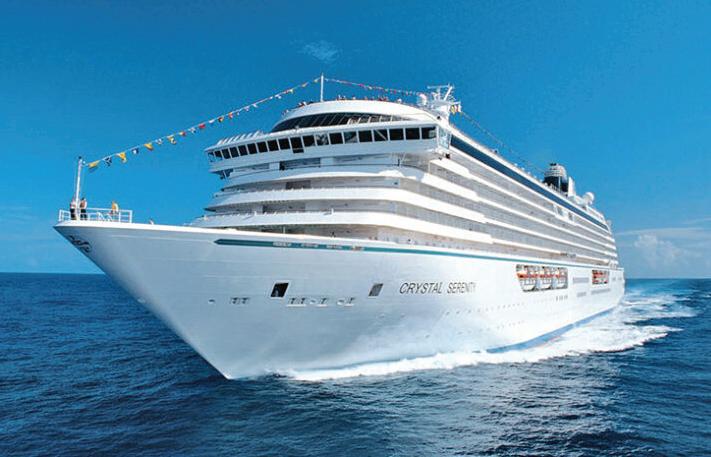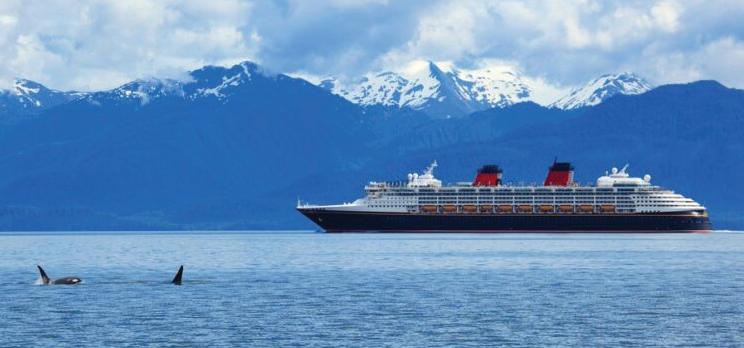
8 minute read
Crystal will be first ocean-going line to restart cruises in the Americas
Crystal Cruises
Crystal Cruises will be first ocean-going line to restart sailing in Americas
MIAMI — Crystal Cruises has announced it will be the first ocean-going cruise line to restart cruises in the Americas, with new all-Bahamian 7-night cruise itineraries onboard Crystal Serenity starting July 3, 2021. Crystal Cruises’ interim CEO Jack Anderson said sales for the new cruises will open on March 18. The “100% Bahamian itineraries” will operate July 3 through October 2021, said Anderson, adding, “this is an exciting day for cruising.”
The week-long cruises will depart from Nassau or Bimini. Ports of call include Harbour Island, San Salvador, Long Island and Great Exuma. Capacity onboard Crystal Serenity will be capped at 900 passengers. Last month Crystal became the latest cruise line to announce required proof of vaccination for all passengers once operations resume.
The cruise line is requiring all guests to be fully inoculated with a COVID-19 vaccine at least 14 days prior to their Crystal cruise. Guests will need to provide proof of vaccination before embarkation and must have received both doses of the vaccine if recommended by the manufacturer by that timeline. In addition, passengers must also complete an online form acknowledging this requirement before their cruise tickets will be issued. An FAQ document on the advisory alert section of Crystal’s website has been published for more details. Dionisio D’Aguilar, Minister of Tourism & Aviation for The Commonwealth of The Bahamas, said The Bahamas is “thrilled to welcome back cruise passengers after a one-year hiatus.” He added that passengers can add pre- and post-stays in The Bahamas, and noted that in addition to Crystal’s vaccination requirement, visitors need proof of a negative PCR test taken no more than 5 days in advance of arrival. Passengers will also need a Bahamas travel health visa. “This is a milestone achievement. After a year of despair and doubt, we will remember this moment,” said D’Aguilar. “We are delighted with this partnership.”
When will the CanadaU.S. border reopen? More questions as vaccinations on both sides of the border ramp up
TORONTO — Vaccination shots are now happening for more than 2 million Americans per day, and U.S. President Joe Biden suggested in a televised address last week that the country’s July 4 celebrations could also mark Independence Day from COVID-19 in the U.S. Canada’s vaccination program is also underway, albeit at a slower pace.
The rollout on both sides has not surprisingly led to more questions for Prime Minister Justin Trudeau about when the Canada-U.S. border will reopen. It was one year ago next week that the Canada-U.S. border closed.
Asked about the ongoing closure and possibility of reopening the border as part of an interview with CTV’s Your Morning on March 12, Trudeau said: “We will see what vaccinations look like, we will see what case counts look like. We will listen to experts on when we can start easing restrictions, but the safety of Canadians needs to come first.”
Many in the travel industry are asking for more of a plan, or at least benchmarks. And not just for the Canada-U.S. border, but for Canada’s borders to all travel. Listing off the agenda for ACITA’s upcoming Zoom meeting with Transport Minister Omar Alghabra, ACITA co-founder Brenda Slater told Travelweek on March 15: “We also need a clear plan to reopen our borders when it’s safe to do so, so we are able to rebuild confidence in advisors and consumers and restart our industry.” ACITA has secured an upcoming meeting with Alghabra though the exact date has remained under wraps as scheduling can change. ACITA co-founder Brenda Slater told Travelweek on March 15 that the meeting is a go: “Our intention is to run the call in exactly the same format we normally do,” says Slater. “The three co-founders, the Minister and members of our group. Specific priority will go to those who have been involved in getting meetings booked, help us with our various projects and have consistently supported us by attending the MP calls.”
Slater says the agenda will drive home ACITA’s key messaging points. “We continue to push for solutions to gain access to federal grant programs, extensions for the CRB, and alternatives to the 3-day quarantine hotel stay,” she says. “We also need a clear plan to reopen our borders when it’s safe to do so, so we are able to rebuild confidence in advisors and consumers and restart our industry. It is important to us that he understands the full picture of why we are struggling and what his ministry can do to help the entire travel community." And ACTA, which has had talks with
the Ministry of Transport and is also now in talks with the Ministry of Finance as the airline bailout heads towards the finish line, is looking more at a metrics-based restart too.
Any restart for travel and tourism won’t come with a magic date but rather a set of conditions, said ACTA President Wendy Paradis at ACTA’s webinar earlier this month. As she noted, the conditions could include the number of COVID cases, the number of hospitalizations, the number of Canadians vaccinated and the development of vaccination verification tools. Meanwhile an analysis piece at CBC. ca says no metrics are in place yet, and quotes one unnamed Canadian official who says, “I can see the light at the end of the tunnel … in the near term, however, people should expect the border measures [to continue].” The CBC reports that two dozen members of U.S. Congress, from states along the Canada-U.S. border, have asked President Biden, to outline a border reopening plan.

Here’s why saving the Alaska cruise season could spell trouble for Canada
TORONTO — Temporary measures have a way of becoming permanent. With that in mind ACTA is joining CLIA and the Tourism Industry Association of British Columbia (TIABC) in their advocacy efforts urging the federal government to protect the future of Canada’s West Coast Alaska cruise program. When Canada’s cruise ship ban in place was first extended to Feb. 28, 2022, a U.S. congressional committee suggested cruise ships could sail Canadian waters without disembarking (or embarking) passengers at Canadian ports.
Now another possible solution, put forth in early March by two U.S. senators, could shut Canada out of the Alaska cruise season completely - and potentially jeopardize every sailing season going forward, says ACTA. WHY ONE FOREIGN PORT MAKES ALL THE DIFFERENCE:
Ships with non-U.S. registry can’t embark and disembark passengers at
Alaska
more than one U.S. port - unless the itinerary also includes a distant foreign port.
Most U.S. cruise lines register their ships with non-U.S. registry - like in Panama - so they’re subject to this rule. It’s all part of the U.S. Passenger Vessel Services Act (PVSA), often referred to as the Jones Act. On Caribbean and Med cruises, with so many ports in so many countries, it’s not a problem.
Where things get tricky is with Alaska cruises - and Hawaii cruises too, for that matter. It’s because of the Jones Act and the PVSA that Hawaii cruise itineraries are so often repositioning cruises that sail out of Sydney, Australia or Vancouver. One of the only major U.S. cruise ships with U.S. registry is NCL’s Pride of America, able to sail all-Hawaii itineraries without the need for a foreign port. The ship is registered in Honolulu. “WE ARE VERY CONCERNED” ACTA reports that two U.S. Senators, Lisa Murkowski and Dan Sullivan, both from Alaska, are working to save the Alaskan cruise industry with new legislation, The Alaska Tourism Recovery Act. If passed, the Act would allow cruise ships to sail to Alaska without requiring a stop in Canada. ACTA President Wendy Paradis says ACTA and the cruise line industry support the health and safety of Canadians being paramount, adding that as vaccines roll out across Canada and the U.S., it’s crucial that the infrastructure for cruising remain intact for the future, and at the same time allow for the potential of sailings later in 2021. The workaround to the PVSA as proposed by the Alaska senators could gravely impact the future of the cruise line industry in Canada, she says.
“We are very concerned that this temporary change to the U.S. Passenger Vessel Services Act could become permanent,” said Paradis.
Paradis adds: “At the very minimum, in 2021, the Canadian government should allow an operational or ‘technical’ stop in Victoria to satisfy the Jones Act and thus allow Seattle-based Alaska cruises to run this season, with the required stop in Canada. It keeps port operations continuing and will allow for a more expeditious start when the cruise ban order is lifted.”
“DEVASTATING IMPACT” If cruise ships are no longer required to call at Canadian ports, “this may have a long term and devastating impact on the B.C. economy and the Canadian travel industry.” In 2019 the positive economic impact to B.C. from the Alaska cruise season was $2.72 billion and 17,384 jobs. ACTA recently discussed the economic impact of the cruise ban to the BC economy with MP Tako Van Popta, for Langley – Aldergrove, BC. MP Van Popta raised this point --and the risk of U.S. workarounds — directing questions to the Minister of Transport during the March 9, 2021 Question Period in the House of Commons.
Paradis points out that any amendments to the U.S. Passenger Vessel Services Act would also have significant and negative impact to the East Coast –


